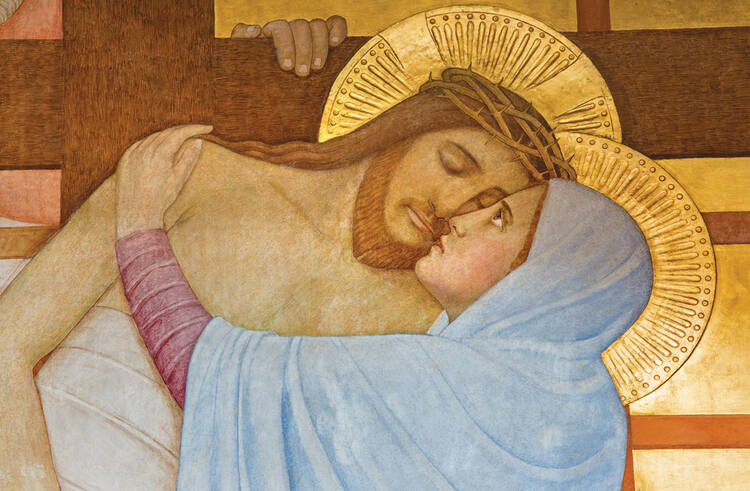St. Ignatius suggests that in prayer we contemplate Jesus appearing after his resurrection first to the Virgin Mary. He explains: “Though this is not mentioned explicitly in Scripture, it must be considered as stated when Scripture says that he appeared to many others.” The meditation that follows imagines how that encounter might have unfolded.
The other women asked me to go with them to the tomb that morning to prepare his body for burial, but how could I anoint for burial one who was destined to rise again? I was drawn so strongly back to his cross on Golgotha that I asked John—his beloved disciple and now my son—to accompany me there before daybreak, when we could be sure that no Roman soldiers would be there to remove the crosses or interfere with our visitation. He willingly joined me, and we set out in the early morning dark and made our way once again out of the city to that holy, horrific place of my son’s execution.
As we expected, the hill was abandoned and desolate at that early hour, but the three empty crosses still stood high against the morning sky, which was now slowly giving up its darkness to the first slivers of sunrise still to come.
I asked John to leave me for a while so that I could grieve and pray on this holy ground where I last saw my son alive, where he called to me for the last time—“Woman”—then spoke those final, self-emptying words—“It is finished”—and died. So John withdrew to a small cluster of olive trees on the other side of the hill to wait for me, and I walked closer to the cross, remembering with cruel detail my son hanging there yesterday, but at the same time comforted that the cross was now empty.
At first I simply stood there, looking at that stark, unforgiving sight of three crosses standing sentinel against the dawn-streaked morning sky, reliving every moment of my son’s agony and mine: for surely the pain I endured as I watched him die was a thousand times more excruciating than what I experienced when giving birth to him in Bethlehem.
But as I continued to stand before his cross, his life was again before me: images of an infant nursing at my breast; Simeon’s strange words of blessing at his presentation at the Temple; his first, faltering but soon firmly planted steps in front of our home in Nazareth; then growing up—so suddenly it seemed—at 12 years of age and staying behind in Jerusalem, so many Passovers ago, to be about “his Father’s business.” I knew then that this would be no ordinary child, and that just as I had said yes to God in bearing him, I would soon have to let go of this child my womb had welcomed into the world for more than just my own maternal pleasure.
In the shadow of this looming cross, now bare of my son’s body but still bearing dark smudges of dried blood where the nails had been—and to my eyes its arms seeming to cradle him toward resurrection—I could not help myself: I finally broke down and wept, kneeling at the foot of his cross, kissing it through my tears and asking my God, “Why? Was it for this that you asked me to bear this child? Was it for this unspeakable end that my soul first magnified the Lord? Holy and Righteous One, in the face of this terrible crucifixion, how can I believe in your resurrection?”
But as I wept and railed at the God who let this happen, I kissed the cross again and was flooded with a warmth and sweetness that suffused my being like the summer breezes off the Sea of Galilee, and moments afterward the sun rose over Golgotha and bathed the cross in an almost blinding light. I remained kneeling there, kissing the cross a third time and letting my body and soul absorb the warmth and light of dawn, when I saw a shadow pass between me and the sloping hill behind the cross, and as I watched, the shadow seemed to come toward me.
Thinking that it was John returning to come and get me, I got up slowly from my kneeling position, and before turning around, said to him, “John, I did not mean to stay here so long, but I am ready now to return home.” But I had not finished speaking when another—not John—said in a voice unmistakably his own, “Woman, behold your Son! I am risen, as I said.”
I turned around, afraid to trust this voice, but it was his, and there he stood, in a clean white tunic like many that I once washed and hung out to dry—my beloved son and God’s—standing before me with eyes brighter than the rising sun, and the tenderest of smiles now spreading across his face as we embraced freely in front of the empty cross that had held him in darkness yesterday, but now was as bright as day.
I would have liked to invite him home for breakfast. But just as he would have done when he still lived with us, he let me go and said, “I must go and tell the others now, but we will meet again before I ascend to the Father. Perhaps we can break bread together then.”
“My beloved son,” I said, “the table will be set for you when you come.”








